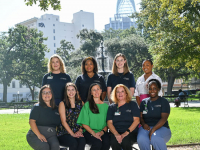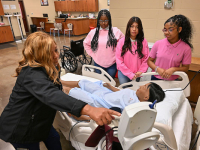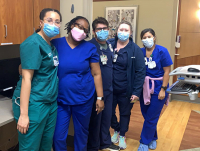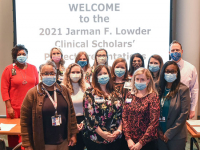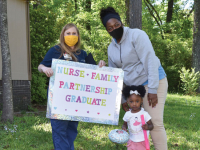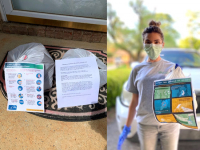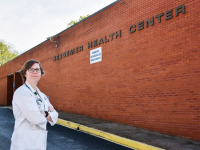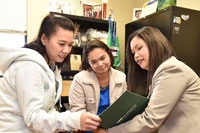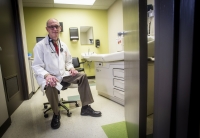 Allison JonesBy Erica Techo
Allison JonesBy Erica Techo
University of Alabama at Birmingham School of Nursing Assistant Professor Allison Jones, PhD, RN is teaming with faculty from UAB Hospital’s Division of Acute Care Surgery and School of Health Professions using a Community Health Scholars grant funded by the UAB School of Public Health to bring potentially life-saving skills to Birmingham City and Jefferson County schools.
This interprofessional partnership is a simulation-based “train the trainer” program for bleeding control and builds on work that UAB School of Medicine Professor of Surgery Jeffrey Kerby, MD, PhD, and Assistant Professor of Surgery Virginia Strickland, MD, both from the Division of Acute Care Surgery, have done in accordance with Stop the Bleed, an awareness program launched by the American College of Surgeons and Hartford Consensus.
The team will worth together to provide the necessary supplies to Birmingham City and Jefferson County Public Schools. They will deliver the training in partnership with the UAB Office of Interprofessional Simulation for Innovative Clinical Practice.
Even though UAB packs the training and bleeding control kits, and the training is free, bringing costs down, funding remains a challenge.
“Most of the grant money is going to provide training kits and bleeding control kits to the public school system because these kits can be cost-prohibitive, especially for such a large systems,” Jones said. “Providing these supplies breaks down a major barrier.”
 Jeffrey KerbyStop the Bleed started in 2015, following the Sandy Hook Elementary School shooting, and it has spread nationwide, providing education on minimizing preventable death due to blood loss in mass casualty events.
Jeffrey KerbyStop the Bleed started in 2015, following the Sandy Hook Elementary School shooting, and it has spread nationwide, providing education on minimizing preventable death due to blood loss in mass casualty events.
“This training parallels many years ago when we started CPR training for lay individuals. We teach them how to do CPR in case someone in the grocery store or another public space needed help,” said School of Health Professions Assistant Professor Michelle Brown, PhD, a co-investigator on the grant. “This is the same idea. We will provide training and ensure equipment is available. The first few minutes of an incident are so critical, and this training can make a difference when waiting on emergency services to arrive.”
When UAB first offered bleeding control training, school systems were hesitant, Strickland said, and it took a few years to get the program off the ground. In the last year, however, they have trained in multiple Birmingham metropolitan area school systems and received positive feedback.
“Teachers who have gone through the training say they feel empowered, that if there is a worst case situation, at least teachers can feel like they have done everything they could,” Strickland said. “Teachers don’t feel so helpless, and they know they have done something to prepare and help their kids.”
Training includes a presentation of slides provided by the American College of Surgeons and the Hartford Consensus with information on staying safe in emergency situations and how to approach a bleeding victim. They also teach wound care, including identifying where the bleed is coming from, covering and packing wounds and stopping bleeding.
 Michelle BrownIn addition to training with a bleeding control kit — including a military-grade tourniquet, gloves, gauze, a compression bandage — they teach how to use common items to stop or control bleeding, Jones said. That way, if a kit is not immediately available, teachers can still take action.
Michelle BrownIn addition to training with a bleeding control kit — including a military-grade tourniquet, gloves, gauze, a compression bandage — they teach how to use common items to stop or control bleeding, Jones said. That way, if a kit is not immediately available, teachers can still take action.
The grant encompasses multiple phases, Jones said, starting with a training focus group. Teachers who have completed the training will provide feedback on what worked and what could be improved, as well as participate in developing a new simulation that makes the training more realistic.
“This is important because this focus group is not made up of health professionals,” said Brown. “While we, as health professionals, are fine dealing with blood, we have to make sure we give the trainees enough simulation to make the situations feel realistic while keeping it a psychologically safe environment in which they can learn and practice.”
Once a new simulation is developed, investigators will ask Birmingham City and Jefferson County schools to identify “champions” who will undergo training and be able to train others.
“We hope that if people come through this training and feel empowered to help others, they will also feel able to teach others. These are faculty — educators by training — so if they feel comfortable educating others in bleeding control, they can empower others and spread this training even farther,” Jones said. “Plus, with a train the trainer focus, more funding can go toward providing training kits and bleeding control kits to more schools. We’re hoping this grant can expand training efforts and get to the point that every classroom has one of the bleeding control kits. More work will be needed, but this grant is a good start.”

